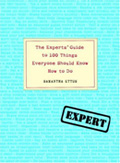Books |
The Experts’ Guide to 100 Things Everyone Should Know How to Do
Samantha Ettus
By
Published: Jan 01, 2005
Category:
Self Help
Back in the day, Dad taught you how to knot a tie and Mom taught you how to write a thank-you note. Your uncle taught you how to swim; your aunt showed you how to set a formal table; your sister taught you how to kiss.
And you went out in the world…competent.
Where are those folks now?
Scattered to the winds, if the sociologists tell us true. Now the only time the family gets together is at the iPod recharger, or when the SuperBowl is on the plasma TV. And now, if you don’t have a Blackberry with you so you can Google, you’re lost — Basic Knowledge is as endangered as the teaching of Greek.
Samantha Ettus — founder and president of Ettus Media Management — decided the world needed a "Cliff’s Notes to life," and she set about creating a small but fact-filled how-to book. She’s one smart cookie. Instead of mastering 100 Key Facts of Life herself, she turned to experts. And then she divided their contributions into sections built around time of day: morning life, work life, home life, weekend life, the big life.
Reading the book is like a Rorschach test — you see what you need to see. You’d never wear a bowtie? Tucker Carlson’s instructions are wasted paper. Know how to make a bed? Then you don’t need this primer.
But there’s a lot of stuff you think you know that you don’t have quite right — I, for instance, got very far in life without realizing you get a better shave if you shower first. Really. You may know this. I’m sure many do. My father, a taciturn man, never said a word about the advantages of hot water and steam to your beard.
More useful advice. From Arthur Sulzberger Jr., publisher of the New York Times: Don’t save old newspapers. If you haven’t read them when they were published, you never will. Frederic Fekkai advises that you don’t use the same shampoo every day. Donald Trump, a buffoon about most things, does have smart advice about negotiation. Larry King shows you how to listen — really listen.
It’s not all fun stuff. An oncologist tells you how to deliver bad news. A therapist breaks an apology into stages. A professor of speech helps you confront something most people fear more than death — public speaking. Suze Orman shows you how to save thousands by banking your pennies.
Then there’s the Ask Heloise stuff. Did you know you should try to remove a stain from the reverse side of the fabric? That you can, in a pinch, use dental floss to sew a button? That tomatoes should never be refrigerated?
Swinging a golf club and mowing a lawn — not my thing. But I loved learning how to wash a car from Charles Oakley, one of my favorite basketball players — and, as few people know — owner of a chain of car washes. I needed to know that I should add warm water to vases of cut flowers every day. And many of you need to know what a "charger" is on a dinner table. (Okay, I’ll tell you: It’s a service plate, and it goes under all others.) And who doesn’t want Debbie Fields’ recipe for chocolate chip cookies?
There are cool factoids here that might be useful at cocktail parties. If you jog a mile, how often does each foot hit the ground? 1,000 times. Says who? Oh….Grete Waitz.
Flaws? In most cases, I’m not expert enough to spot them. But I did see one. Cecile Hudson, Senior Coffee Education Specialist at Starbucks, knows how to brew coffee — but she doesn’t tell you how to keep it hot. The Answer is NOT in an electric coffeemaker. Coffee isn’t a simple liquid, it’s a colloid, and in a colloid, molecules change — and get bitter — over heat. If you want your third cup of coffee to taste as fresh as your first, you want to pour the just-brewed coffee into a tightly-sealed thermos.
One of the chapters tells you how to give a gift. It’s too modest. For the graduate setting out in life or the young couple lacking guidance — or even old duffers who think they know it all — this book is the gift to give.


